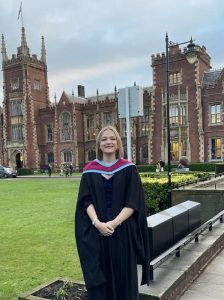This post is part of our Research Initiation Scheme for 2023-2024.
Can you tell me a bit about your academic experience at Queen’s so far?
I started at Queen’s back in 2018 and I did my undergraduate [degree] in Spanish. I did my [first] two years at Queen’s and then I went abroad to Spain, where I worked as a language assistant. That was during Covid, so it was a bit of a different experience, but I was in the south of Spain there. I came back and did my final year, then went on and did the MRes, also looking at Spanish.

What topic did you choose for your MRes and what drew you to it?
I handed in my dissertation back in September [2023] and the title was ‘Language Acts and World (Un)Making: The Poetics of Power and Resistance in the Drama of Ana Caro and Leonor de la Cueva’. I was looking at Golden Age drama and specifically the comedia. I’d done a bit of that in my undergraduate work, I’d looked at a few different areas but I hadn’t seen a lot of work done by female dramatists. I was interested in how they wrote resistance into a lot of their work, because they followed the societal norms and expectations of writing literature in order to be able to write in the period, and they also managed to get in things that made their work different to the canonical work of the period.
What was the highlight of your post-grad experience?
That’s a difficult one. Honestly, probably handing my dissertation in! No, making my work and research fit within the field and seeing links between the research done by everyone else. The collaborative idea of research is that you get to do something that’s a bit different, but you get to draw on work that has already been written by other people and make your own space within the field. For me, this was developed throughout the MRes: the research methods classes which introduced various lenses to look at Caro and Cueva’s work, the discussions with my supervisor, and my own research into publications on the authors. Coming to conclusions using different research methods was really interesting. I guess it’s [about] coming up with something new, isn’t it?
Continue reading